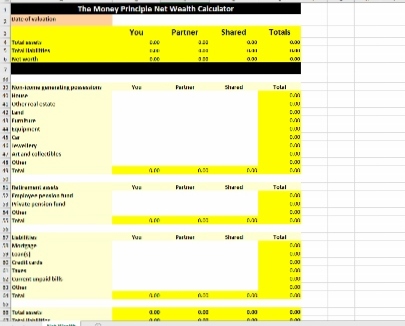Do you know what is net worth?
Do you know how much is your net worth at this moment?
Do you know how to calculate how much you are worth?
You don’t?
Yes, I thought this may be the case. And for your sake, I hope you are not one of the 20,000 people per month searching to learn how much Floyd Mayweather is worth.
Because knowing how much is your net worth is much more important than knowing the wealth of celebrities. It is time to focus on yourself, on your life and stop escaping into someone else’s!
You know, I was a bit like that myself; I didn’t know my wealth either. Except, I didn’t care much about other people’s wealth either. As you well know this disregard for money only led to a lot of debt and heartbreak. In fact, it nearly brought John and me to a complete money disaster.
Here is the deal:
If you want to achieve financial health, you need to get this one right. You must make sure that your net worth is increasingly positive. Your wealth must also be appropriately structured.
Since my mission is to help as many people as possible to achieve financial health (once you become financially healthy, wealth will follow naturally) today I’ll share what there is to know about your net worth and how to calculate it. Including what it is, why knowing your net worth is important, what tools you can use to track it and why you shouldn’t let it define you.
What Is Net Worth?
Your net worth, also known as net wealth, is the total amount of your assets (and possessions) minus your liabilities.
When the value of your assets and possessions is higher than your liabilities, your net worth is positive; and this is very good news, indeed.
The more positive your net worth is the more choices you have in your life.
Oh, and remember how I told you that your cash flow is the most important number in personal finance? You can add your net worth as a very close second.
This is Why You Must Know Your Net Worth
“Why is knowing my net worth so important?” – you may think.
One thing is sure: it is important not because you could brag (nicely, of course) or because you could compare yourself to others and fit neatly in cliches. Like ‘I am part of the 10%’ kind of cliches.
No. Knowing your net worth will serve you well because:
#1. Your net worth may be higher than you thought; or not
Photo by Sharon McCutcheon on Unsplash
Whatever you think about your position on the board of the ‘game of wealth’ you are probably wrong. You can trust me on this one. Or we can experiment together.
Let me ask you this: do you see yourself as ‘broke’ or ‘wealthy’? It is important to answer honestly and to write your answer down. You’ll have to get back to this one when you’ve calculated your net worth.
When I did this one for the first time, it turned out that I was way out of step. Because we had a lot of consumer debt, I had grown to see myself (us) as ‘broke’. When I calculated our net worth I had to admit with astonishment that we are ‘wealthy’. I’ve never forgotten this.
The knowledge that we are actually rather wealthy completely changed the way in which I think, behave and make decisions. It was a good surprise.
You may be spot on. Then use the knowledge to change or improve your situation.
#2. You could really plan your money and your life
Ignorance is never a good foundation for planning. This includes ignorance about your net worth since this is what provides the knowledge (and confidence) to plan for the next week, next month, next year or retirement.
Need an example? Here it is.
I bet you’d choose not to buy a gadget you’d enjoy for a couple of weeks if you can see how this money would increase your net worth; with projections.
I bet you’d use your monthly cash flow differently if you know by how much this will increase your net worth when invested properly.
And I’d bet that knowing where you are in the game of wealth would transform the way you do things.
So do me a favour and try this:
- Write down where you think you are in terms of wealth.
- Calculate your net worth using one of the tools I’ll tell you about in the next part of this post.
- Compare the two.
Now you can either start working towards some really big dreams – like becoming financially independent in X years – or change the course of your finances. It is your call.
#3. Knowing how much you’re worth helps you ‘keep your eye on the ball’
Probably better say that knowing, and following regularly, your net worth will help you keep your eye on your money and your life dreams. Long term.
#4. Knowing your wealth allows you to take the long view
Knowing your net worth is the only way to be able to make long-term life and financial decisions.
Want an example?
I’ve been wondering whether it would be possible in principle to give up work next month. Call me weird but it makes me feel better when I know that I have a choice.
Now, you can decide whether you can afford to go on a holiday using your monthly cash flow. The problem is that here we are talking about a very long vacation.
Then I came across a question response by Doug Massey on Quora where he told about the F.T.I. coefficient (F*ck That Index) he developed to make fast decisions about whether or not he could retire. It is simple and you can calculate it like this:
(your age x your net worth) / your annual expenses
You see; you need to know your net worth, not simply the size of your pension fund. (Oh, and if the coefficient is over 1,000 one can ‘retire’.)
I did the calculation and you know what?
I can leave my job tomorrow if I want to. Feels good to know. On the other hand, if my coefficient was lower than 1,000 I would have started looking at my net worth, thinking of ways to increase it or change its structure; or reduce my annual expenses. Whatever.
#5. Knowing what you are worth makes you feel more financially secure
Knowing and following regularly, your net worth also increases the level of control you have over your long-term finances (and life).
And having a high level of control usually makes us feel more secure in life and finances.
Best Net Worth Calculators
You can go all ‘professional’ and use one of the really sophisticated tools like Personal Capital or YNAB. The problem is that these work best for people in the US (particularly Personal Capital).
Or you can use some of the free (and fairly basic) tools like the CNN Money one. (Yes, these are mostly in $$$s and are not very versatile).
There are also some interesting apps that can do that; just have a look and test them.
I still prefer good old-fashioned spreadsheets to the more fancy tools and apps – it does the job, usually is free and are versatile enough to allow you to change it to reflect your life.
Here is a selection of the spreadsheets that my blogging friends use and I believe are versatile enough to be immensely useful.
- Net Worth Calculator (Budget Breakaway): Finally a net worth calculator that has pounds rather than dollars in it (not that it matters that much; it is all money, after all). What concerns me with this one are some of the assumptions and the confusion between ‘assets’ and ‘possessions’ (for example the house you live in is not strictly speaking an asset).
- The Money Principle Net Worth Calculator: This is the net worth calculator we developed and uses to follow our net worth. It is fairly detailed and assumes a difference between ‘non-income generating possessions’, like your house and your cars, ‘assets’, ‘cash and savings’ and ‘retirement assets’. This matters when you assess the structure of your wealth. TMP Net Worth Calculator also allows you to include, or not, the value of your life insurance in the calculation.
Now it’s your turn to choose one of these calculators. Please make sure that you choose not the one you think you’ll fill in fastest but the one that allows you the most opportunities for wealth-building decisions.
To make these decisions, you need to be able to answer the following questions:
- How much am I worth?
- What is the constitution of my wealth (including liquidity, possessions, income-generating assets etc.)?
- How can I mobilise my wealth better to generate the regular income I need?
Words of Caution…
Finally, I’d like to offer the following words of caution.
Don’t be duped by the size of your net worth
Where net worth is concerned, the saying ‘the bigger the better’ fully applies. Still, it is possible to have a very decent, even large, net worth and be in financial trouble. I know; this is what happened to us. To make sure this never happens, I had to completely change the structure of our wealth. Analyse your net worth carefully and watch for the following:
- The proportion of net worth that is liquid and easily accessible. What proportion of your wealth to keep liquid changes with age but you cannot afford to be ‘cash poor’ at any stage of life.
- The proportion of your wealth in non-income generating possessions. You need to live somewhere and you need to get around; true. But at any stage of life you have to make sure that the wealth you have tied up in non-income generation possessions is no more than half of your total net worth.
- The other half of your wealth ought to be invested in income-generation assets. If you don’t at least aim to achieve this, you are missing a trick and, as much as I hate to say it, deserve all the financial problems you are going to hit.
- Remember that you can always transform a ‘non-income generating’ possession into an asset. For example: if you rent out a room in your house, you’ve done it. Now, invest the rent and you are on your way to prosperity.
For building true wealth you need to continuously increase your net worth and ensure it’s structured for optimal growth.
Your net worth is not your self-worth
You may be thinking that this is a cop-out in case you found that your net worth is very low or even negative.
It isn’t.
My net worth is very positive and I’ll never allow it to define me. In fact, my self-worth is what defines my net worth.
Or as Macklemore said:
“Make money, don’t let money make you.”
That is it!
Now, go and calculate your net worth! Analyse its structure and come back to tell us what did it tell you about your life and your finances.
photo credit: Colorful Stones Texture – HDR via photopin (license)



NetworthShare (also featured on Budgets Are Sexy’s site) is a great free resource to start tracking your Net Worth!
https://www.networthshare.com
@Networthshare: Thanks for the resource :).
So true. People need to just mind their own business. People can tell you everything about another person, but when it comes to their own life, they cringe. Floyd Mayweather has already done his thing and he’s chased his dreams – you need to BE the dream chaser, not watch the dream chaser.
I agree with you that your net worth isn’t your self worth too. Coca-Cola’s valuation is much more than its assets on a balance sheet, and so is mine. And yours.
@James: Welcome, James. I’m also very glad you agree and have put it so well. Yes, we need to chase our dreams not stand on the sidewalk and watch others live their amazing lives.